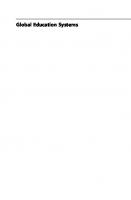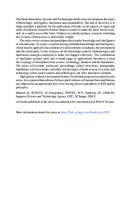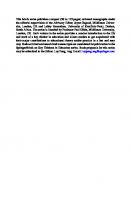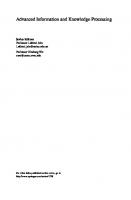Modernizing Moroccan Education Empowering Through Advanced Information Systems
Modernizing Moroccan Education Empowering Through Advanced Information Systems
144 64 545KB
English Pages [6] Year 2023
Recommend Papers

- Author / Uploaded
- Dr. zeroual khalid
File loading please wait...
Citation preview
Modernizing Moroccan Education: Empowering Through Advanced Information Systems
Dr. zeroual khalid Université Mohammed V de Rabat Université Ibn Tofail de kenitra In an era of rapid technological advancement, Morocco stands at the cusp of transforming its educational landscape through the integration of a new generation of information systems. We give the profound impact and potential of leveraging state-of-the-art technology to revolutionize education in Morocco. By implementing advanced information systems, such as driven learning platforms, interactive digital classrooms, and data analytics for personalized learning, this initiative aims to enhance accessibility, quality, and inclusivity within the educational sphere. We give the strategies, challenges, and anticipated outcomes of integrating these systems into the Moroccan educational framework, envisioning a future where
technology becomes a catalyst for equitable and innovative learning experiences.
Modernizing Moroccan education with a focus on peace involves aligning educational goals, practices, and values with the promotion of peacebuilding, conflict resolution, and fostering a culture of tolerance. Morocco's educational landscape has been evolving in response to global advancements in technology. We give the historical trajectory of education in Morocco and the pivotal role of information systems in shaping its modernization. It delves into the traditional educational paradigms and the need for a transformation to meet the demands of a rapidly changing world. Harnessing Data Analytics for Educational Insights elucidates the transformative power of data analytics in Moroccan schools and universities. It emphasizes the utilization of student performance data, learning patterns, and administrative statistics to inform strategic decisions, personalize learning pathways, and identify areas for improvement within the educational ecosystem. Detailing the concept of digital classrooms, this section discusses their role in overcoming geographical barriers, fostering global connectivity, and promoting collaborative learning experiences among Moroccan students. It highlights the immersive and interactive nature of digital classrooms, enabling enriched educational engagements beyond traditional classroom settings. Focusing on the emergence of driven educational tools, this part gives their potential to customize learning experiences for Moroccan students. It showcases adaptive learning algorithms, tutoring
systems, and powered educational assistants, elucidating how these technologies cater to individual learning styles and pace, thereby enhancing student comprehension and retention. Highlighting the pivotal role of these systems in student engagement and inclusivity, this section showcases how technology bridges gaps in access, fosters diverse learning experiences, and accommodates varying student needs, thereby promoting equity and inclusivity across Moroccan education. the transformative potential of information systems in Moroccan education. Strategies for Integration outlines comprehensive strategies for the successful integration of advanced information systems into Moroccan education. It delineates a roadmap encompassing development, teacher training programs, curriculum alignment, and collaborative partnerships with technology providers. Moreover, it gives funding logics and public-private partnerships to sustainably support this transformation. we delve into the expected impact of incorporating these information systems into Moroccan education. It discusses the anticipated outcomes, such as improved learning outcomes, enhanced access to quality education, personalized learning experiences, and the potential to bridge socio-economic gaps in education across the country. Future Prospects and Recommendations for the evolution of education in Morocco through advanced information systems. It provides recommendations for policymakers, educators, and stakeholders to foster continued innovation, scalability, and sustainability in leveraging technology to transform the educational landscape. Additionally, it considers the ethical and
social implications of increased technology integration in education and proposes ways to mitigate potential challenges The integration of advanced information systems marks a pivotal moment for Moroccan education, heralding a new era of innovation, inclusivity, and quality. The exploration of these systems platforms, classrooms, and data analytics reveals their transformative potential across various facets of education. Morocco's educational landscape, historically responsive to global advancements, now stands at the brink of a significant shift. Information systems emerge as catalysts driving this transformation. From data analytics shaping strategic decisions to digital classrooms fostering global connectivity, these systems revolutionize teaching methodologies, empower educators, and streamline administrative tasks. The shift from conventional pedagogies to interactive, personalized, and data-informed instructional strategies is pivotal. Examples showcased the power of these systems in creating personalized learning paths, nurturing collaborative environments, and adapting to individual student needs, thereby ensuring enhanced engagement and inclusivity. While acknowledging challenges such as the need for policy reforms. Integration strategies encompass development, teacher training, and collaborative partnerships, offering a roadmap toward successful implementation. The anticipated outcomes of this integration are promising improved learning outcomes, increased access to quality education, and the potential to bridge socio-economic gaps. Recommendations for policymakers, educators, and stakeholders gives the importance of continued innovation, scalability, and ethical considerations in
technology integration. As Morocco steps into this transformative journey, the amalgamation of technology and education presents vast opportunities. It not only ensures the alignment of educational systems with the demands of the modern world but also fosters an environment where every student can thrive. The envisioned future of Moroccan education through information systems is one of equity, innovation, and adaptability a future where technology serves as a cornerstone in shaping empowered, globally competitive, and inclusive learners.









